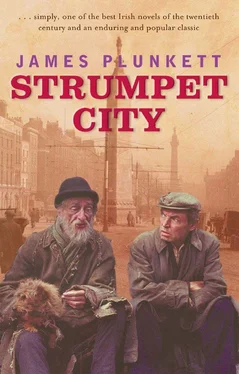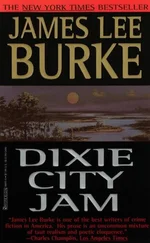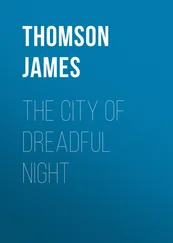‘A decent poor skin,’ Rashers said.
‘Could you do his work?’
‘Stoking a little bit of a boiler wouldn’t be beyond me, Father. Sure what’s in it?’
‘If you are free tomorrow call to me after the eight o’clock mass. I’ll give you a week’s trial.’
‘As boilerman?’ Rashers asked, not sure that he understood aright.
‘As temporary boilerman,’ Father O’Connor qualified.
He went back into the church. He was satisfied to feel he would be able to tell Father Giffley that he had engaged a boilerman. If the fellow proved unsuitable he could be easily replaced. It was one duty disposed of for the moment. Still restless, he climbed the side stairs to the organ loft. Below him the pews, divided into geometrical sections by the centre and side aisles, moved in rows to the altar rails. Above them in its funnel of red glass, the sanctuary lamp displayed its tiny flame. Father O’Connor sat on the stool at the large harmonium which did service instead of an organ and leaned his elbows on the manual. The keys were yellow and cracked, like practically everything else in St Brigid’s. When he rested his foot on one of the foot pumps a thin note sounded. He sat upright, startled. Realising that one of the keys must be stuck he made a laborious search in the half-dark of the gallery until he found it. He prised it gently back into position with his fingernail until the sound stopped. Then he pumped with his feet and pressed the note again. This time it released when he removed the pressure of his finger. He pressed it again, listened, built a chord on it, moved to a related chord and completed a phrase which reminded him of the ‘Ave Verum’. He began to play it, softly at first and then, as the music engaged him, more loudly and purposefully. He switched to a secular tune and then to a march by Handel which he remembered from his student days. It filled the church with a cracked and wheezy grandeur, so that the three or four of the faithful scattered in the pews below turned their heads and looked up. Father O’Connor played for some time, until the gallery door opened and the clerk stood waiting for his attention.
‘What is it now?’ Father O’Connor said. The small mirror in front of him, used by the organist so that ceremonies could be followed without it being necessary to turn the head, reflected the rose-coloured sanctuary lamp and caught the effulgence of unseen shrine candles against a velvet darkness.
‘It’s Father Giffley. He wants to speak with you immediately.’
Wondering what piece of urgent unimportance his superior had fastened on this time, Father O’Connor accompanied the clerk to the vestry. He was in time to see the young couple as they left and recognised the girl immediately.
‘Were they the callers about the marriage?’ he asked the clerk.
‘They are, Father.’
‘I think I know what Father Giffley wants. Where is he?’
That was quite typical of Father Giffley, to send for a person and then expect to be followed to his rooms.
‘I’ll go immediately,’ Father O’Connor said. He tried not to betray his annoyance.
He crossed the courtyard with its grimy Calvary set against the high stone wall and climbed the stairs. Father Giffley was entering details of something in a black book.
‘You had one of my former parishioners with you I see,’ Father O’Connor said.
‘You recognised her?’
‘She was a servant girl in the house of friends of mine—the Bradshaws.’
‘What do you know about her?’
‘She left her employment, presumably to take up with a young man.’
‘The young man was with her. They explained to me.’
‘I hope she is not in trouble. Mrs. Bradshaw would feel responsible.’
Father Giffley put down his pen and stared.
‘You sometimes shock even me,’ he said at last.
‘I don’t understand,’ Father O’Connor protested.
‘If the unfortunate girl is in trouble, as you term it, don’t you think that her plight is more worthy of your sympathy than the delicacy of Mrs. Bradshaw’s feelings?’
‘That is not what I meant.’
‘The girl is not in trouble, unless you consider wanting to get married to a decent young man a trouble.’
‘I am sorry. I thought you might wish to question me about her background.’
‘Don’t be a fool,’ Father Giffley said and returned to his writing.
Father O’Connor stared at the bowed head and struggled to control his temper. At last he said: ‘You mustn’t speak to me like that.’
Father Giffley looked up as though surprised to hear the voice and find someone still there.
‘You must not speak to me as though I were a servant.’
‘I see,’ Father Giffley said. He laid his pen aside and folded his arms.
‘And what are you—if not a servant?’
‘I am a priest.’
‘A priest. And what is a priest?’
‘He is not to be spoken to like a dog,’ Father O’Connor said.
‘Are you questioning my authority?’
‘Not your authority. Your manner. Your cruelty.’
‘Do you wish to make a complaint?’
‘Very much so.’
‘Then make it to any quarter you think fit,’ Father Giffley challenged. ‘As for me, I will go on treating you as I feel you deserve.’
‘You have no right to humiliate me.’
‘I am trying to teach you that social disease cannot be cured with buns and cocoa. Until you condescend to live in the world of the parish you serve I will continue to chastise your pride.’
‘I have made my protest,’ Father O’Connor said, ‘and I will leave it at that for the moment.’
He put his hand on the door handle and was about to leave when Father Giffley snapped: ‘One moment, Father.’
He turned round.
‘You have not yet heard what I wanted to speak to you about.’
‘I am sorry,’ Father O’Connor said, ‘I thought you had finished.’
‘You were playing on that foul instrument in the organ loft.’
‘Is that forbidden too?’ Father O’Connor asked bitterly.
‘Tonight it was not fitting.’
‘May I ask why not?’
‘Any of my respected parishioners could tell you why not. The body of the poor boilerman who served us well is lying in the church. Was he too lowly to qualify for your respect?’
Father O’Connor’s face changed.
‘You had forgotten?’ Father Giffley suggested.
Father O’Connor said nothing. He was trapped. It was true. He had forgotten.
‘That is what I wanted to say,’ Father Giffley concluded.
CHAPTER SEVEN
On Easter Tuesday evening Mary and Fitz moved into 3 Chandlers Court. Their feet on the unfamiliar stairs made an echoing noise and they had to pick their way carefully until a figure holding an oil lamp appeared on the landing above them and addressed her for the first time as Mrs. Fitzpatrick.
‘This is Mrs. Mulhall,’ Fitz introduced.
‘I’ve taken the liberty of laying down a bit of a fire,’ Mrs. Mulhall explained. ‘I thought it would make the room cosy.’
The elderly woman before her looked quiet-natured and good-hearted. There would be a new life, with new friends.
‘You’ll come over later?’ Mary invited.
‘For a little while,’ Mrs. Mulhall agreed, ‘when you’re both rested.’
The living room was bare except for a table, a cupboard, some chairs and a long couch Fitz had bought and repaired in his spare evenings.
They drew this over to the fire.
‘It’s a bit bare, isn’t it?’ Fitz said.
‘It’s home.’
They sat down. The fire in the half-light cast friendly shadows. It was theirs, at least. There would be no more partings, no more reluctant goodbyes, no more being the only person in the whole world. On impulse she kissed Fitz, surprising him. He knew something had moved her deeply and said:
Читать дальше












